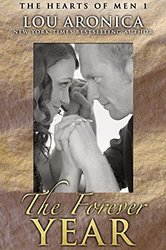INTERVIEW WITH LOU ARONICA, AUTHOR OF THE FOREVER YEAR
4/20/16 INTERVIEW WITH LOU ARONICA, AUTHOR OF THE FOREVER YEAR
In The Forever Year, Jesse, a young man, is the last child in his family, born when his father was late middle-aged. Growing up, Jesse felt that his father and older siblings lived in a world apart from him and that he didn’t know his dad as his siblings did. When his father is no longer able to live alone, Jesse surprises his siblings by arranging for Dad to live with him. During the time the two men spend together, Jesse hopes they’ll connect. What he doesn’t expect is to learn that the love of his father’s life was not Jesse’s and his siblings’ mother. Yet their mother was the only woman their dad married, a marriage that lasted most of his lifetime and lasted until their mother’s death—not an unhappy marriage.
middle-aged. Growing up, Jesse felt that his father and older siblings lived in a world apart from him and that he didn’t know his dad as his siblings did. When his father is no longer able to live alone, Jesse surprises his siblings by arranging for Dad to live with him. During the time the two men spend together, Jesse hopes they’ll connect. What he doesn’t expect is to learn that the love of his father’s life was not Jesse’s and his siblings’ mother. Yet their mother was the only woman their dad married, a marriage that lasted most of his lifetime and lasted until their mother’s death—not an unhappy marriage.
As he listens to his father’s story, Jesse also is dating and enjoying the most meaningful romance of his own life, although he doesn’t expect it to last. He doesn’t believe romantic love can last. As Jesse begins to understand why his dad is telling him about a woman he loved before Jesse’s mother, Jesse starts to question his own conception of the limitations of romantic love.
 Question: There may not be an ideal match for everyone, but there is for some, according to Jesse’s father. Others settle for something less than the ideal match. While this view is romantic, on the one hand, it’s disenchanting, on the other: people who don’t couple with their incomparable love—and the implication is that most won’t—make do. Jesse’s father made do. How would his marriage to his first love have differed from his marriage to his wife?
Question: There may not be an ideal match for everyone, but there is for some, according to Jesse’s father. Others settle for something less than the ideal match. While this view is romantic, on the one hand, it’s disenchanting, on the other: people who don’t couple with their incomparable love—and the implication is that most won’t—make do. Jesse’s father made do. How would his marriage to his first love have differed from his marriage to his wife?
Answer: I’ve had the good fortune of seeing a number of these great matches up close. My parents were married for sixty-five years before my father died, and they were a true team. My oldest sister has a marriage that is still dynamic after more than forty-five years. And, while it took me a while to get it right, my wife and I have been together for more than twenty years now, and the fire is still there. I think what Mickey would have experienced with Gina is a relationship where the romance would have remained indefinitely. I’m not suggesting some silly happily-ever-after state of endless bliss, but a relationship where the desire – both emotional and physical – remain even as the day-to-day pressures intervene.
Q: I think men are hardwired to desire sex with as many partners as possible—not that all men want this psychologically, but their bodies crave it enough that the prospect of a man marrying, vowing he won’t be with any woman but his wife for the rest of his life, gives him pause. Men aren’t sure they can be faithful. Also, while their minds may be certain that the security of marriage and family is worth the sacrifice, their gonads question the tradeoff. But Jesse has met a woman that his father believes to be Jesse’s incomparable love, a woman not only worth the sacrifice but also a woman capable of settling him down. How would you help a son of your own assess whether he’s met the woman of his life? What should matter most to a young man asking himself if this might be his one true love, asking himself whether he should pop the question?
A: My son and I have actually had these conversations. I’ve tried to give him the benefit of my experience and the lessons from my mistakes. What I’ve told him is that I know for a fact that it’s possible to be with a partner with whom you feel sparks forever. The key, I think, is connecting on a number of levels at the same time: values, physical attraction, empathy, and amusement are the four that come to mind immediately. I try to show all of these in The Forever Year in Mickey’s relationship with Gina and in Jesse’s relationship with Marina.
Q: I am amazed that today many states no longer teach driver education. It’s too expensive, authorities say. But what’s more important than teaching teens to drive? Likewise, what’s more important than teaching young people to analyze what makes romances and marriages work? What core factors would be stressed in an imaginary “Romance and Marriage” course you taught? And should the curriculum be bifurcated: if you meet your perfect match this, if you don’t that?
A: I love this idea. It’s fascinating to me, actually, that teens get all kinds of education about sex and drugs, but really none on relationships. I suppose if I were designing this curriculum (and, trust me, I don’t consider myself an expert by any means), I’d build it around points of connection along the lines of what I suggested in my last answer. I’d want to delve deeply into what these things mean in a relationship and what signs to look for. I wouldn’t want to bifurcate this. I don’t think kids need to learn about settling for less; what they need to learn is what’s possible and what’s realistic. They’ll draw their own conclusions down the road.
Q: For readers of The Forever Year looking for similar books, can you offer a few titles?
A: My friend and colleague Steven Manchester has written several extremely good male-viewpoint love stories. I’d strongly recommend Pressed Pennies or Gooseberry Island. Of course, Nicholas Sparks is the premier writer in the genre. The other writer who comes to mind is Richard Paul Evans (not his fantasy novels, obviously), though there’s something of a spiritual overlay to his stories.
Q: I notice that the new cover of The Forever Year includes a subtitle “The Hearts of Men 1.” Are you writing a second novel about a man confronting love? Do you plan a series?
A: There are actually seven novels and a novella in the series right now. I found myself returning to this theme in a variety of forms over the years, and it dawned on me about six months ago that it made sense to link all of the stories under one header since they were already linked thematically. My two favorites (other than The Forever Year) are When You Went Away, which juxtaposes romance and parenting, and The Journey Home, which was inspired by my parents’ relationship.
Gary Garth McCann
First-prize winner for short works and for suspense/mystery, Maryland Writers’ Association, Gary Garth McCann is the author of the novella Young and in Love? and of the novels The Shape of the Earth and The Man Who Asked To Be Killed, praised at the Washington Independent Review of Books. His most recent published stories are available online in Chelsea Station Magazine, Erotic Review Magazine, and in Mobius: The Journal of Social Change. His other stories appear in The Q Review, reprinted in Off the Rocks, in Best Gay Love Stories 2005, and in the Harrington Gay Men’s Fiction Quarterly. See his blogs at garygarthmccann.com and streamlinermemories.com.
- Web |
- More Posts(57)